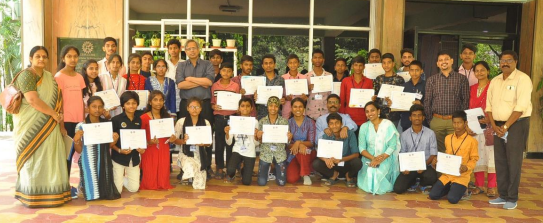सीएसआईआर - कोशिकीय एवं आणविक जीवविज्ञान केन्द्र
वैज्ञानिक तथा औद्योगिक अनुसंधान परिषद
भारत का नवप्रवर्तन इंजन
Date : सितम्बर 4, 2024

Hyderabad, 29th April, 2022: As a premier life science research institute of India, CSIR-Centre for Cellular and Molecular Biology (CCMB), Hyderabad hosts a wide expertise in life sciences. This ranges from the most cutting-edge questions in the field to addressing societal challenges. Telangana Social Welfare Residential Educational Institutions Society (TSWREIS) is a state-wide network of 235 schools, largely catering to women students from marginalized families. The two organizations have developed a children-centred program – Milo CCMB, for TSWREIS students with funding from the Department of Science and Technology.
In the Milo CCMB program, started during the COVID-19 pandemic, CCMB scientists made animated videos on some of their well-known work that is also easy to align with high school curricula, conducted online scientist interactions with the TSWREIS students over six months. Following this, some of the best TSWREIS students were selected to spend a week at CCMB on the basis of a quiz. At CCMB, these students did hands-on experiments and activities that were designed to help them understand their prescribed school syllabus better as well as connect with the work that happens in a research institute.
“The Milo CCMB program aims to create role models in the TSWREIS community who are aware of the scientific advances and possess problem-solving abilities. We strongly believe that these skills are important for the young people of India, no matter what careers they choose for themselves,” said Dr Somdatta Karak, the Science Communication and Outreach Officer at CCMB, and Lead, Milo CCMB.
“In a country like India, most students who pursue science are interested in vocational subjects like engineering and medicine. Few who pursue sciences as a career often always come from privileged backgrounds. This causes only a select section of society to be involved in knowledge generation, who also decide the kinds of solutions that are designed from the knowledge generated. We need a much greater participation of people from diverse backgrounds for science to be accessible to the society,” said Dr Vinay Nandicoori, Director, CCMB.
“At TSWREIS, we implement many programs to provide quality education and encourage activity based learning in the classrooms to promote scientific temperament in our students. We are extremely happy to collaborate with CCMB on the Milo CCMB project. Our students have enjoyed learning about the research at CCMB and interacting with the CCMB scientists. We are positive that this internship serves as a launchpad for their future research career,” said Praveen Mamidala, Joint Secretary (Higher Education), TSWREIS.
“TSWREIS has been collaborating with institutions from all across the world on various academic and co-curricular projects. Milo CCMB is particularly interesting because we introduced discussions on the concepts of genetic diseases, infections, and nature conservation to these students. As they learn the science of these topics they also become the ambassadors and take these learnings to their communities to create awareness” said Sri D. Ronald Rose, IAS, Secretary, TSWREIS.
 Advertisement no 07/10 for the post Junior Scientist.
Advertisement no 07/10 for the post Junior Scientist.
 List of shortlisted candidates for the temporary positions against CCMB Web Notif.No.0724/B- [26-08-2024]
List of shortlisted candidates for the temporary positions against CCMB Web Notif.No.0724/B- [26-08-2024]
 Result of selected candidates for the temporary positions against CCMB Web Notif.No.0724/A - [21-08-2024]
Result of selected candidates for the temporary positions against CCMB Web Notif.No.0724/A - [21-08-2024]
 Notification of Schedule for Trade Test and Downloading of Admit Cards for the posts of Gr. II (1)/Technician (1) against Advt.No:01/2021 - [19-08-2024]
Notification of Schedule for Trade Test and Downloading of Admit Cards for the posts of Gr. II (1)/Technician (1) against Advt.No:01/2021 - [19-08-2024]
 List of selected candidates for the temporary positions against CCMB Web Notif.No.0624/A - [14-08-2024]
List of selected candidates for the temporary positions against CCMB Web Notif.No.0624/A - [14-08-2024]
 List of shortlisted candidates for the temporary positions against CCMB Web Notif.No.0724/A - [02-08-2024]
List of shortlisted candidates for the temporary positions against CCMB Web Notif.No.0724/A - [02-08-2024]
 Notification No.0824/A for various temporary positions on contractual basis- [02-08-2024]
Notification No.0824/A for various temporary positions on contractual basis- [02-08-2024]
 Notification No.0724/B for various temporary positions on contractual basis - [29-07-2024]
Notification No.0724/B for various temporary positions on contractual basis - [29-07-2024]
 List of shortlisted candidates for the temporary positions against CCMB Web Notif.No.0624/A- [19-07-2024]
List of shortlisted candidates for the temporary positions against CCMB Web Notif.No.0624/A- [19-07-2024]
 List of Provisionally empanelled candidates for Engagement as Project staff Vide Notif.No.2024/1 - [15-07-2024]
List of Provisionally empanelled candidates for Engagement as Project staff Vide Notif.No.2024/1 - [15-07-2024]